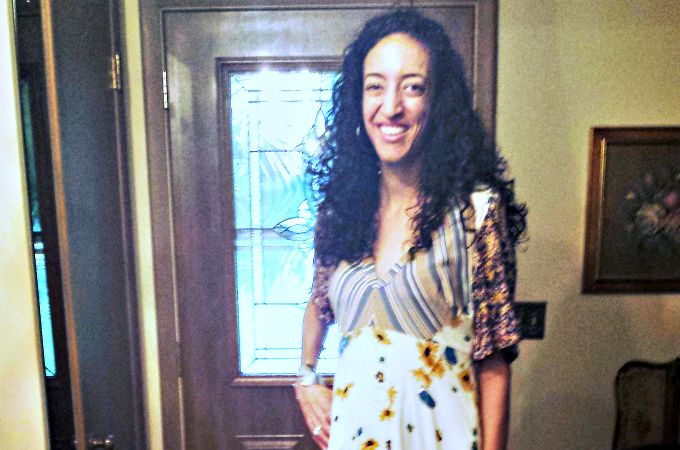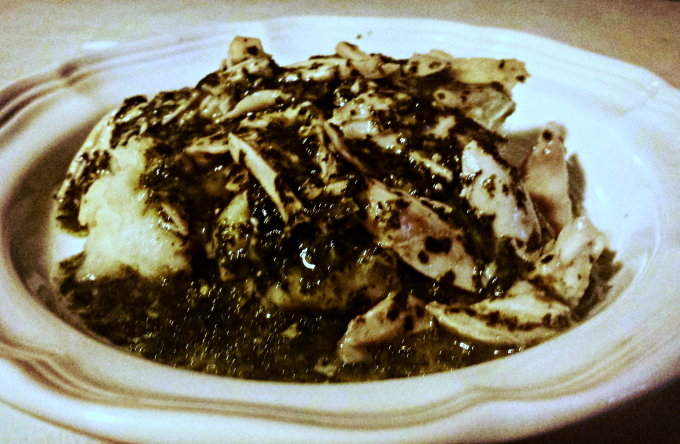
Diversity in AIP is a story series showcasing the wide variety of people from different backgrounds adapting AIP to not only support autoimmune healing, but also to honor important cultural, religious, ethnic, or national food traditions. We are sharing these stories regularly to encourage folks of similar backgrounds to join our Autoimmune Wellness movement and to inspire the community as a whole about the growing reach of our healing message. If you are interested in sharing your story, please let us know by filling out our interest form.

This month’s “Diversity in AIP” story comes from Basmah. Basmah comes from an Egyptian Muslim background and after 14 years with Crohn’s disease, she changed her life with AIP. She shares how AIP actually brought her closer to her family and added new depth to the practice of her religion.
Do you have an autoimmune disease or chronic illness? If so, how long have you been dealing with it (them) and when did you get your diagnosis?
I was diagnosed with Crohn’s Disease right after I turned 16 (what wonderful sweet 16 gift, thank you!). I am 30 years old, so I have been managing it for 14 years.
When did you discover AIP and what was your first indication that it was working for you?
I discovered the Autoimmune Protocol (AIP) a few years ago, but did not implement it into my life until May 2016. I attempted other diets such as gluten, dairy, and corn-free in the past. The only one that helped before AIP was when I sought help from my acupuncturist, who stated that warm foods were easier on the digestive system, and instructed me to eat meat, eggs, and cooked vegetables in soup form. I felt a significant difference in my symptoms, energy, and mood. It was easily the best decision I made, and I stuck with this regimen for two years. I was weaning off my meds, but after a switch in jobs and a temporary lapse of insurance caused me to stop my meds too fast, I ended up with a bad flare up in December 2015.
I went back to the Standard American Diet for a few months, and my recovery was practically nonexistent. After a considerable amount of reflection, I remembered how well I felt when I changed my diet. I did not want to go back to eating soup, but raw food did not sit well with me either. I officially started AIP with the same modifications of low carb, cooked produce. Relief was evident within three weeks, so I have stuck with it ever since. I still see my acupuncturist and gastroenterologist for integrative treatment. It took a lot of effort figuring out my triggers (especially since I did not start out as the world’s best cook, hah!), but it is worth it. I have successfully reintroduced eggs, and I am healing, slowly but surely.
Do you have an important cultural, religious, ethnic, or national background that plays a role in your dietary choices? If so, how have you honored your food traditions while following AIP?
As a Muslim, I am not allowed to eat pork or drink alcohol. It is easy to modify recipes using other meats, and alcohol isn’t recommended on AIP anyway. The tricky part living in America is finding “halal”, or permissible, meat. The only requirement for certification is how the animal was slaughtered, not raised or treated. Luckily this is changing, as Creekstone Farms beef is both pasture raised and halal, and meat imported from New Zealand is allowed. Otherwise, I love to buy my food locally. Connecting with the farmers reminds me of when I used to go to the markets in the streets of Cairo with my taita (grandma).
Being an Egyptian is a little trickier than being a Muslim. Grains, legumes, and nightshades are considered staples, and I am currently unable to consume any of them. Thankfully, the Egyptian/ Middle Eastern diet appreciates variety. It is a major plus that organ meat and seafood are very popular since I have developed a newfound love for both!

Molokhia
Can you share some adaptations you’ve made to special dishes to make them work with AIP?
One of the easiest dishes to modify is kofta! Similar to meatballs, kofta is typically made with grains and non-AIP seasonings. I simply omit those and stick with the ground meat and herbs. I like to add liver and greens to help with my anemia. I also recently cooked molokhia, a classic Egyptian dish consisting of jute leaves and chicken or rabbit. It is traditionally served over rice, so I used mashed parsnips instead. I even had my mom try it and she liked it! Molokhia used to be one of my favorite foods growing up, so I am happy that I was able find some adaptations. The more confident I become in my cooking skills, the more recipes I am willing to try. It goes to show that like many things in life, AIP might seem limited and daunting at first; however, with a little bit of creativity, I can enjoy the foods that I love!
Are there any foods that were part of important food traditions you followed previously, but still work great within the AIP framework?
Meat and seafood are very popular in the Egyptian/Middle Eastern diet, so they work excellently within the framework. As I have mentioned before, organ meat such as liver is common, but I avoided them until I began experimenting with AIP. So, there are certain food traditions that I appreciate more now than I did pre-AIP.
Muslim holidays have some traditions as well. For instance, breaking your fast with dates and milk is common during Ramadan. My health currently prevents me from fasting or drinking milk, but I eat dates within reason of carb intake. Eid Al Adha is known as the Feast of Sacrifice. It celebrates the time when Prophet Abraham was about to sacrifice his son Ismael, but God gave him a ram to sacrifice instead. Muslims now eat lamb or goat this time of year; I cooked leg of lamb during my first Eid on AIP.
Has it been difficult to garner the support of family or friends in your culture, religion, ethnicity or country, while following AIP? If so, what tips would you give to others from your same background who want to try AIP?
My family and friends were initially concerned when I was restricting foods. It is considered rude to refuse food at someone else’s house, so I would be on the receiving end of unwarranted comments. At first the commentaries were upsetting to the point that I once ate something that made me sick for days. Not worth it! Lesson learned and I never strayed again. More people recognized that I had the right idea when my symptoms started improving. They are now used to me bringing my own food everywhere, and some have recently offered to make me food separately. My advice would be to never let anyone get to you. Remember that you were once in their shoes, not knowing any better, always questioning whether diet has an impact on health, etc. For the people that are more “vocal,” remember that there is a hierarchy regarding your approach. You can be open with your friends, but take a more respectful, “Thank you” and move on manner with the elders. Be patient, and most families and friends come around eventually.
My family likes it when I share a new recipe with them. After a while, they became less concerned about variety and sustainability, and more about the fact that I was still losing weight on AIP. I thought it was part of the healing process; that things get worse before they get better. My family urged me to simply eat more of what I was already eating, but it was not until my GI doctor suggested TPN (IV nutrition therapy) that I truly listened. Turns out my family was right! I am sticking with AIP, but eating bigger portions. Within a month, my symptoms, lab work, and overall well-being improved significantly. So, my other tip: be open to listening to your loved ones. Everyone has the same ultimate goal in the end – for you to feel better.
Did any aspect of your healing journey with AIP deepen your connection to your culture, religion, ethnicity, or nationality and the food traditions it follows?
Absolutely! Whenever I was feeling down during my flare up, my family would remind me that Allah (God) gave me this pain so that things will be better in the afterlife. It comes from a hadith (sayings from the Prophet Muhammad, peace be upon him) that quotes, “Whatever befalls a Muslim of exhaustion, illness, worry, grief, nuisance or trouble, even though it may be no more than a prick of a thorn, earns him forgiveness by Allah of some of his sins.” This hadith is a big reason why I never stopped trying. I knew I was being looked after, and I needed to look after myself as well.
One aspect of AIP that resonates very well in Islam is mindfulness – take it slow and chew food well so that it can be enjoyed and easily digested. I always sat in front of the television while I ate. The food would be gone within minutes without a thought. How could I enjoy something that’s supposed to give me fuel if I don’t even appreciate it? Another food tradition that both Egyptians and Muslims value is togetherness. One of my favorite memories is when Taita would serve an abundance of food and tea for breakfast, and my family and I would sit at the table eating and enjoying each other’s presence. I became isolated over the years because of Crohn’s disease, and often missed that companionship. It was decided on my AIP journey that I would be thankful for everything that is given to me. I cook everything from scratch, and sit at the table for all of my meals. I make more effort to get together with my friends, and when I do, I focus more on them than what I am eating. These simple changes have allowed me to reconnect with my roots, which I believe is the reason why my healing is stronger this time around.
If you’d like to follow Basmah’s journey, you can find her on Instagram at @thisimmunelife.
Would you like to share your Diversity in AIP story? Let us know by filling out our interest form.
















0 comments